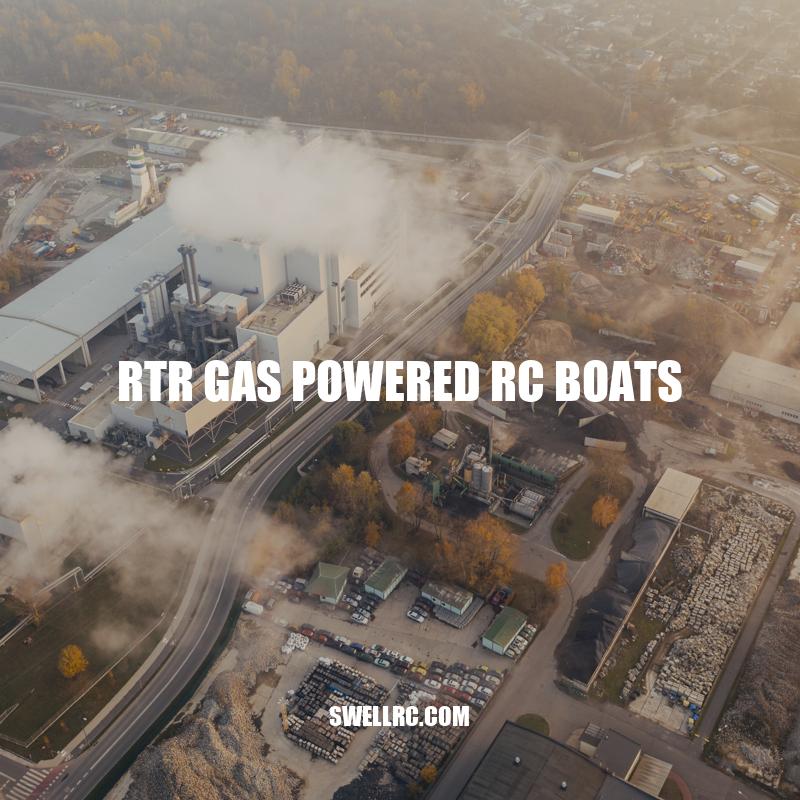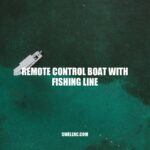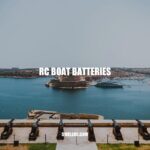RTR Gas Powered RC Boats: Features, Benefits, and Tips
Gas powered RC boats are an exciting and adventurous way to enjoy the water. They offer the thrill of speed and the challenge of controlling a miniature vessel that relies on internal combustion and mechanical components rather than wind or human power. Ready-to-run (RTR) models, in particular, are a popular choice for beginners and experienced hobbyists alike. Unlike building from scratch or buying a kit, RTR boats come pre-assembled with most of the necessary components installed and ready to go. This allows you to get started more quickly and easily, without having to invest a lot of time or money upfront. However, there are still some important factors to consider when choosing and maintaining an RTR gas powered RC boat. In this article, we will explore the features, benefits, and limitations of RTR gas powered RC boats, as well as some tips on how to select and operate them safely and effectively. Whether you are new to the hobby or a seasoned pro, this guide will provide you with the essential information you need to enjoy your RTR gas powered RC boat to the fullest.
RTR gas powered RC boats are model watercraft that are powered by gas engines and come ready to run out of the box. These boats are designed for radio control use and feature a variety of components such as engines, fuel tanks, propellers, and remote controls. Some of the main features of RTR gas powered RC boats include:
- Speed: Gas engines can deliver high speeds and acceleration, allowing RTR boats to reach up to 70+ mph depending on the model.
- Power: Gas engines also provide more power than electric motors or nitro engines, making them suitable for larger, heavier boats, or for performing stunts and tricks.
- Realistic sound and smoke: Unlike electric boats, gas boats emit sound and smoke that simulate the effect of a real boat, which can add to the overall experience.
- Convenience: RTR boats are pre-assembled and come with most of the necessary components included, saving time and effort for the user.
However, as with any hobby or activity, there are also some potential disadvantages of RTR gas powered RC boats that you should be aware of. Some of the downsides to consider include:
- Cost: Gas boats can be more expensive than electric or nitro boats, with some models costing several hundred to several thousand dollars.
- Noisy: Gas engines are generally louder than other types of engines, which may be a consideration if you plan to use your boat in a quiet area or close to other people.
- Maintenance: Gas engines require regular maintenance, including cleaning, tuning, lubrication, and fueling, which can be time-consuming and involve some technical skills.
When choosing an RTR gas powered RC boat, it’s important to consider your needs, preferences, and budget. Some popular brands of RTR gas boats include Pro Boat, Aquacraft, and Traxxas. You can find these boats and accessories at hobby stores or online retailers such as Amazon, Tower Hobbies, and Horizon Hobby.
What is the speed record for RC gas boats?
The current speed record for RC gas boats is 143.2 mph (230.4 km/h), achieved in 2018. This record was set by Dave Villwock at the World Water Speed Championships in San Angelo, Texas. For more information about RC gas boats and their speed capabilities, check out websites like rcboatmag.com or rchobbiesonair.com.
Gas engines are one of the most popular types of power source for RTR gas powered RC boats due to their power and reliability. Here are some of the key features of gas engines for RC boats:
- 2-cycle or 4-cycle: Gas engines come in either 2-stroke or 4-stroke versions, with 2-cycle engines being more common in RC boats due to their higher power-to-weight ratio and simpler design.
- Gasoline or methanol: Gas engines can run on different types of fuel, including gasoline, methanol, or a mix of both. Gasoline is more widely available and easier to use, while methanol provides more power and runs cooler, but requires more tuning and maintenance.
- Water-cooled or air-cooled: Gas engines need to be cooled to prevent overheating and damage. Water-cooled engines use a system of tubing and pumps to circulate water around the engine and transfer the heat to a radiator. Air-cooled engines use fins or fans to dissipate heat directly into the air.
- Spark ignition: Gas engines require a spark to ignite the fuel-air mixture in the cylinder. This is usually provided by a spark plug connected to an electronic ignition module or magneto. Some advanced engines use alternative ignition systems such as CDI (capacitive discharge ignition) or glow plugs.
Gas engines for RC boats can range from a few cubic centimeters to several liters in displacement, depending on the boat size and application. Some of the most popular brands of gas engines for RC boats include RCGF, Zenoah, and Homelite. You can buy gas engines for RC boats and other accessories at online retailers such as RC Planet, NitroPlanes, and Tower Hobbies.
What is the best gas for a boat motor?
The best gas for a boat motor is typically marine-grade gasoline, which is formulated to prevent fuel system corrosion and engine knock. It is recommended to use gasoline that has an octane rating of at least 87. Ethanol blended gas may be cheaper, but it can damage fuel lines, engine seals, and carburetors. Some popular brands of marine-grade gasoline include ValvTect, Chevron, and Texaco. Always check your boat’s owner’s manual or consult with a marine mechanic for specific recommendations.
When selecting an RTR gas powered RC boat, there are several factors you should take into account to satisfy your preferences and maximize your enjoyment. Here are some of the most important things to look for:
- Speed: Gas powered RC boats can reach speeds of up to 50 mph or more, depending on the engine, the propeller, and the hull design. If you’re looking for a high-speed model, choose one with a powerful engine and a streamlined hull.
- Size: RC boats come in different sizes, from micro models that fit in your hand to large-scale vessels that require a trailer or a workshop. Make sure the size of the boat is compatible with your available space, transportation, and storage options.
- Build quality: The quality of the materials, construction, and finish can affect the durability, performance, and appearance of the boat. Look for RTR models that use sturdy components, such as fiberglass or ABS plastic hulls, metal or carbon fiber shafts, and waterproof electronics.
- Control system: RC boats use various types of radio controls, such as 2.4GHz, AM, or FM, with different ranges, channels, and features. Choose a model that uses a reliable and responsive control system that suits your skill level and preferences.
- Brand and model reputation: Read reviews and feedback from other RC boat enthusiasts to gauge the quality and reliability of the RTR gas powered RC boat you want to buy. Look for established brands with a good track record of customer satisfaction and technical support.
Table: Comparison of popular RTR gas powered RC boats
| Brand and Model | Speed (mph) | Size (in.) | Build Quality | Control System | Price |
|---|---|---|---|---|---|
| Pro Boat Impulse 31 | 45+ | 31 | Fiberglass | 2.4GHz | $500 |
| Aquacraft Rio 51Z | 40+ | 51 | Fiberglass | 2.4GHz | $700 |
| Atomik Barbwire 2 | 25+ | 17 | ABS | 2.4GHz | $200 |
You can find RTR gas powered RC boats at local hobby shops, online retailers, and specialized websites such as RC Groups, RC Universe, or RC Boat Magazine. Some manufacturers also offer accessories and upgrades for their boats, such as different propellers, engines, batteries, or decorations.
How to choose a motor for a RC boat?
When choosing a motor for your RC boat, there are a few key factors to consider:
| Factor | Considerations |
|---|---|
| Battery | Make sure that the motor is compatible with the type and voltage of battery that you plan to use. |
| Boat size and weight | The motor’s power and propeller size should be appropriate for the size and weight of your boat. |
| Speed and maneuverability | Determine if you want a motor that prioritizes speed or maneuverability, as this will affect your choice of motor type (brushed or brushless) and propeller design. |
Additionally, it’s important to consider the brand and quality of the motor, as well as any available warranties or customer reviews.
Some popular RC boat motor brands and products include:
- Traxxas Velineon Brushless Power System
- AquaCraft Super Vee 27 Brushless RTR Catamaran
- Pro Boat React 17 Self-Righting Brushless Deep-V RTR
Researching and comparing different options can help you make an informed decision and choose the best motor for your RC boat.
Maintaining and Operating an RTR Gas Powered RC Boat: Tips and Precautions
To keep your RTR gas powered RC boat in good condition and avoid accidents or failures, you should follow some basic maintenance and operation guidelines. Here are some tips to help you with that:
- Clean the boat after every use: Remove any debris, water, or fuel residue from the boat and the engine using a soft cloth, a toothbrush, or compressed air. Avoid using harsh chemicals, abrasive materials, or water on the engine or the electronics.
- Tune the engine regularly: Adjust the carburetor, the spark plug, and the fuel mix to optimize the performance and prevent damage or stalling. Follow the instructions in the manual and use a tachometer to measure the rpm and idle speed of the engine.
- Store the boat properly: Keep the boat in a dry, cool, and ventilated place, away from heat sources, sunlight, and moisture. Disconnect the battery and drain the fuel tank if you don’t plan to use the boat for a while.
- Check the fuel and battery levels: Always use fresh, high-quality fuel that is compatible with the engine and the conditions. Monitor the battery charge and condition, and use a battery charger or a power pack with the right voltage and capacity.
- Observe the safety regulations: Do not operate the boat in crowded, shallow, or polluted waters, or where it may interfere with other boats, swimmers, or wildlife. Wear eye protection and gloves when fueling or handling the boat and avoid smoking or using open flames nearby.
By following these tips, you can enjoy your RTR gas powered RC boat safely and for a long time. You can also join online forums, groups, and communities of RC boaters to share your experiences, learn new tricks, and get advice from fellow enthusiasts. Some useful websites that offer RC boat resources, reviews, and products include Hobbytron, Horizon Hobby, and Tower Hobbies. Make sure to keep up with the latest technology, trends, and events in the RC boating world, and have fun riding the waves with your RTR gas powered RC boat!
How do you maintain a power boat?
To maintain a power boat, here are some tips to follow:
- Keep the boat clean and wash it regularly to prevent buildup of salt and grime
- Check and clean the propeller to avoid damage
- Change the engine oil and filter as per the manufacturer’s recommendations
- Check and maintain the batteries to ensure they are fully charged and in good condition
- Inspect the fuel system, including hoses, filters, and tanks, for any leaks or damage
- Check the boat’s electrical system, including switches and wiring, for any issues
- Store the boat in a dry, covered area to protect it from the elements
- Perform routine maintenance tasks like tightening bolts and lubricating moving parts
For more detailed information, check online resources such as BoatUS or product recommendations from companies such as West Marine.
Conclusion
RTR gas powered RC boats are a great way to experience the thrill of high-speed boating without breaking the bank or investing too much time and effort in building or customizing your own boat. With their powerful and efficient gas engines, rugged builds, and easy-to-use remote controls, these boats provide a fun and exciting pastime for anyone who enjoys water sports or RC hobbies.
Whether you are a beginner or an advanced RC boater, there is an RTR gas powered RC boat that suits your style and preferences. By choosing a reputable brand and model, doing your research, and following the maintenance and operation tips mentioned in this article, you can enjoy your RC boat for many years and get the most out of your investment.
To summarize, RTR gas powered RC boats offer the following benefits:
- Easy to assemble and operate
- Affordable and convenient
- Faster and more powerful than electric boats
- Realistic sound and smoke effects
- Flexibility and versatility
However, they also have some limitations and risks, such as:
- Less customizable than other types of boats
- Less durable and prone to damage
- Noisy and polluting (compared to electric boats)
- Greater safety precautions and maintenance requirements
Overall, RTR gas powered RC boats are a rewarding and exciting hobby that can provide hours of fun and entertainment, as well as opportunities to learn new skills, meet new people, and explore new places. If you are looking for a new challenge or a fresh perspective on boating, try an RTR gas powered RC boat and see where the waves take you!



